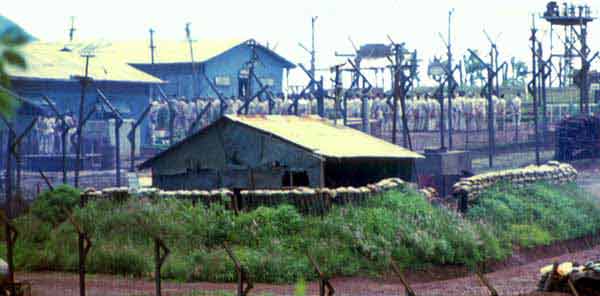The Intel officer who took me to the
big POW camp run by ARVN in the Biên Hòa area (see photo with previous
story) told me he hoped to get the maximum information from prisoners
without mistreating them. The local authorities could be very rough
on the NVA/VC prisoners who had served in the forces that killed their
friends and family members. We'd heard about the tiger cages and such.
The captain wanted to get the prisoners first because he figured he
could get more out of them with better treatment. He may have been right,
depending on the individual and his situation. (Field interrogations,
like those fictionalized in the films like Rules of Engagement, were,
of course, conducted with a different urgency and intensity.)
One day we sat in on the interrogation of a talkative Northern peasant
who claimed to have information on the capture of a couple of our fliers
in the North. With his dusty purple pajamas and shaved head and pleading
tone, he didn't seem much like the defiant, angry prisoners we had transported
there in the past. How much of his story was true was questionable,
of course, but the captain took careful notes on the translated responses.
He recalled that one of the pilots wore a religious medal, that the
NVA soldiers had protected them against angry peasants in the area,
that one was white and one black, that they had bombed a bridge, but
since they had failed to destroy it, were not killed outright by the
locals. He recalled they had refused water from a local farmer but accepted
tea when he boiled it. The prisoner identified himself as an NVA private
who suffered from a concussion in a B-52 raid and was sent to the rear
and into Cambodia to gather food for the troops. He had been out looking
for food when the American/ARVN incursion took place. A local Cambodian
farmer grabbed him and turned him over, he said, for a small sack of
money. He was ashamed he had been sold for so small a fee.
As he rambled on, the questioners offered him oranges and cigarettes.
At first he refused, probably fearing reprisals by other POW's, but
then took what he could get. He seemed a lot more afraid of his fellow
prisoners than of his ARVN/US interrogators.
As we exited through the concertina-wire gates and turned onto the
dirt road back to Biên Hòa AB, the captain seemed amused. "Well,
that was tough one. I thought he'd never shut up. His feeling were hurt
because of how he was captured, but they'd have been more hurt if he'd
known he hadn't been traded for a wad of 'p' at all but just for a bag
of plain old rice!"
